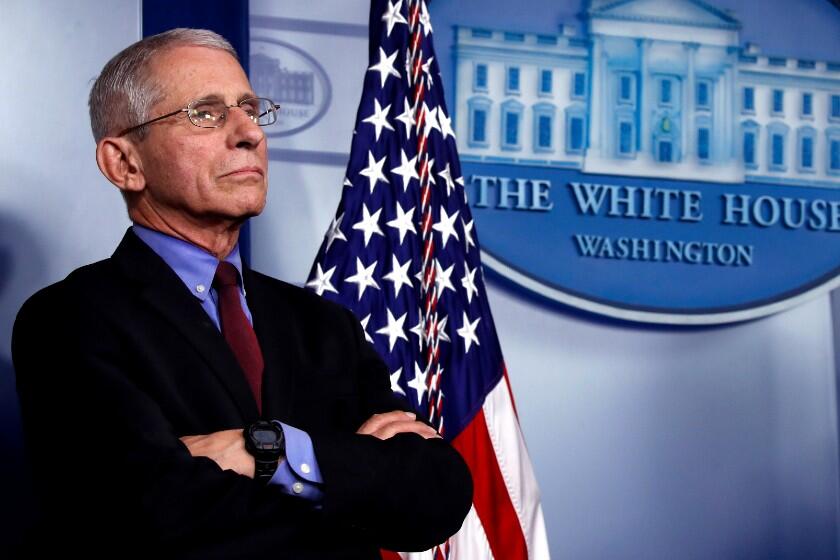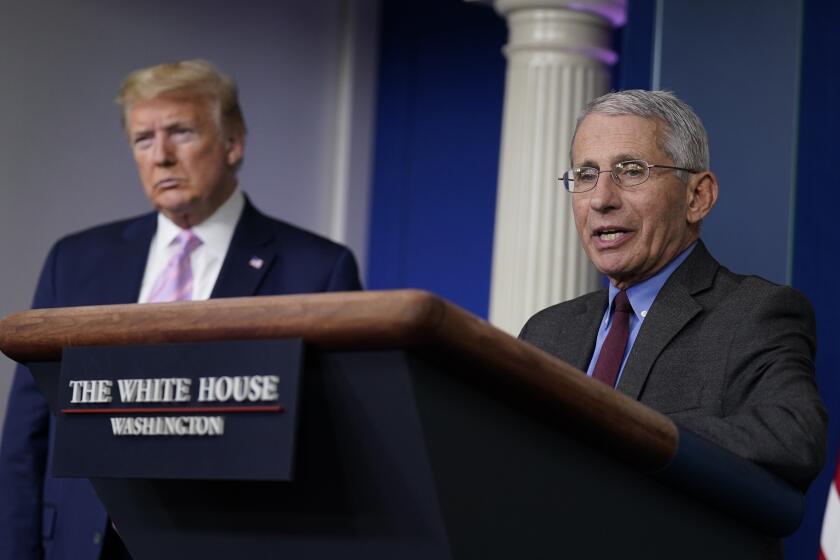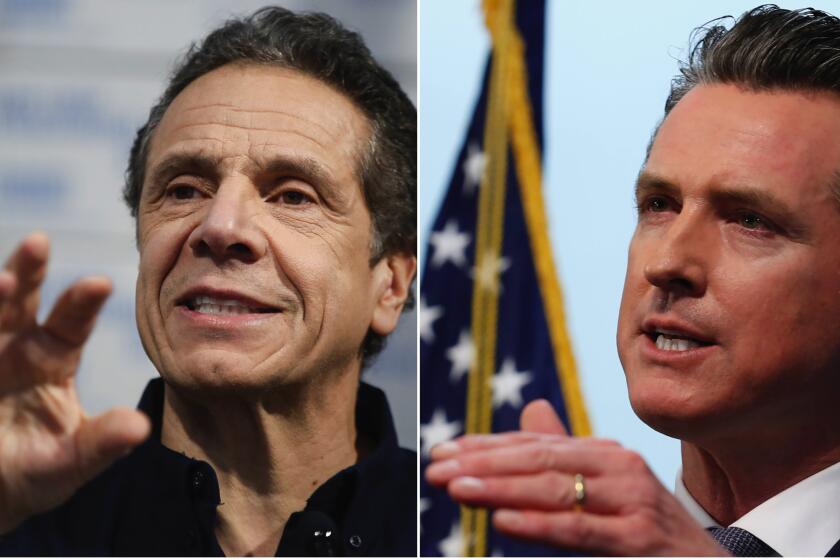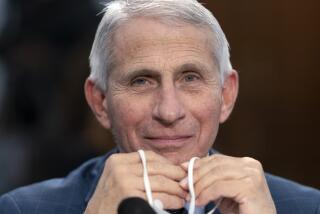Column: Is Anthony Fauci the Sexiest Man Alive? Who the hell cares?
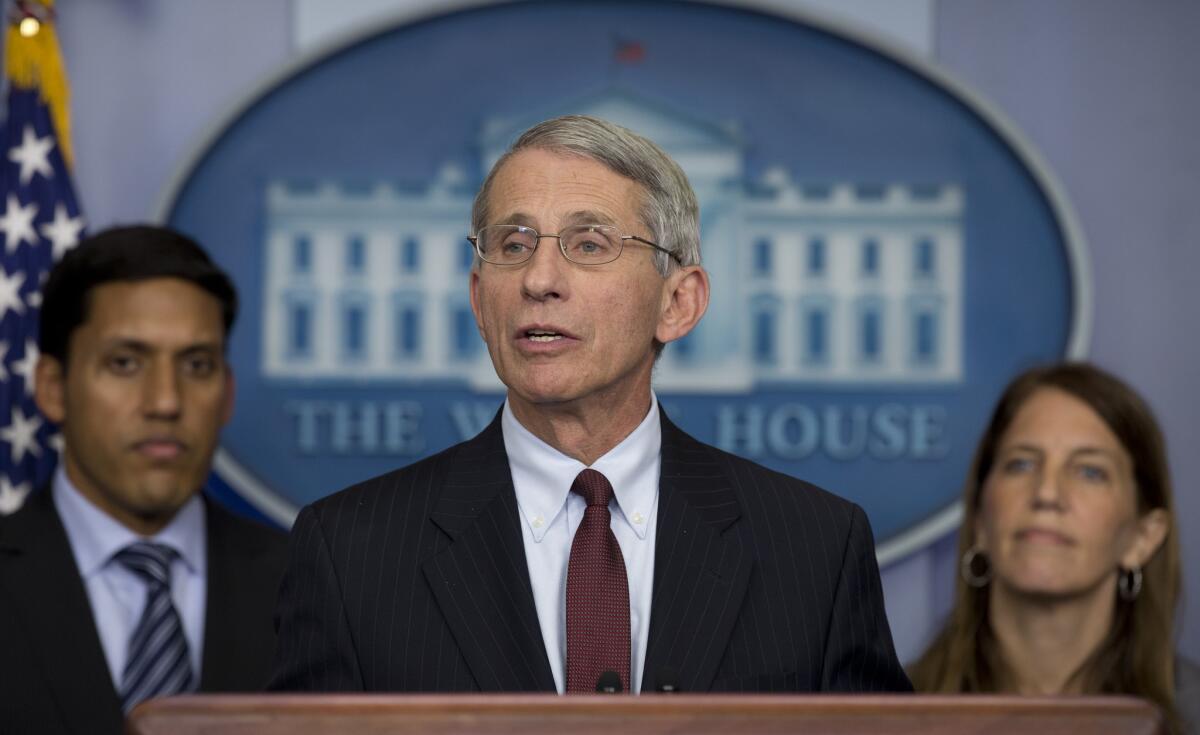
For the love of God, can someone please tear up the petition to make Dr. Anthony Fauci People magazine’s Sexiest Man Alive?
If not, can we please at least stop talking about it?
I get that it’s a compliment; for some, heaven help us, the ultimate compliment. Fauci’s unflappable and highly competent demeanor has been a beacon of strength and surprise amid the squishy, tweet-driven, ass-covering, daily-contradictory triumph of personal feelings over irrefutable facts that has been the Trump administration’s reaction to this pandemic.
Let others voice outrage about churches closing down, or sputter about the indignity of wearing masks; express concern about the Dow Jones or explain why it is now perfectly safe for Floridians to go back to the beach (which they only recently vacated) because, well, just because.
Dr. Fauci will continue to stand in front of microphones talking only about the things he knows. Not what he wants, wishes, thinks or feels. What he knows.
No matter how blatantly Fox News anchors attempt to shift his on-air narrative, no matter how often the president contradicts him in public and to his face, Dr. Fauci quietly but firmly sticks to the facts.
Some fear that President Trump will sideline Dr. Fauci, an epidemiologist and civil servant who has warned that 100,000 to 200,000 Americans could die from the Covid-19 pandemic.
So now expert is the new sexy, from the specs to the striped socks — immunology the new rock ’n’ roll. We all feel it, that swoon of relief when Fauci begins to speak, but here’s an idea: Let’s not succumb.
Let’s all take a deep, socially distanced breath and choose to resist complimenting the person who very possibly stands between 328 million Americans and complete disaster by granting him an accolade he would share with Chris Hemsworth (no offense, man).
Resist the desire to “humanize” the head of the National Institute of Allergy and Infectious Diseases by asking him for dating advice or make him more “accessible” by tarting him up with some pop culture makeover.
You think I’m overreacting? There’s already a bobblehead, a late-night fan club, a prayer candle and socks; can a reality show be far behind?
Because that’s how it works when you start slinging around the term “sexy.” Sexy sells and this economy is going to need some fast, hot sales in the near future. Who wouldn’t tune in to see Fauci judge which contestant comes up with the best COVID-19-preventing protocols?
But if life is really going to look different in the coming months, let’s begin with this.
Let’s not make Anthony Fauci a rock star. Because he doesn’t need to be a rock star. He needs to be what he is — a physician and expert immunologist who emerged from the AIDS crisis with a unique understanding of the relationship among science, humanity and public policy. A man with the near-miraculous power to separate his ego from his mission, to bring science to an avowedly anti-science presidential administration, to express expertise in front of a president who doesn’t believe in experts.
Anthony Fauci, our national truth-teller, spoke plainly before he was forced to make a retraction by a president more comfortable with lies.
Let’s not destroy that highly delicate balance by dragging sexy into it. Unlike his late-night fans, or his president, for that matter, Fauci does not need to be concerned with television ratings. Wouldn’t it be nice if it stayed that way?
As scientific fact forces the culture to shift away from desire to reality, we have a chance to honor the line between pop culture influence and genuine expertise. We know what life looks like when we blur that line. It looks like Drs. Oz, Phil and Drew, men who became media personalities because they were often willing to tweak facts for the sake of ratings and are now being slammed for their inability to stay silent about things they do not understand. Like COVID-19, because, guess what? None of them are immunologists or epidemiologists, and “Dr. Phil” doesn’t even have a medical degree. “We need our mojo back,” Oz said recently on “Hannity,” before suggesting that getting kids back in school was worth raising the COVID-19 mortality rate. As if some bizarre form of national swagger was worth making schoolchildren canaries in a coal mine. (He has since walked back his remarks after overwhelming criticism.)
We have a chance to return expert culture to actual experts.
The emergence of personal testimony as a valuable social force — whether through memoir, daytime talk show or the blogosphere — was a democratizing triumph of popular culture. Millions of people, ignored by or refused entrance to traditional means of disseminating information, were suddenly being heard. And it changed the world.
It also made everyone an expert.
Two state pandemic coalitions represent a refusal to bow and scrape to Trump or to fight one another for federal resources.
But the personal is a complement to, not a replacement for, the empirical; feelings can stem from or help create facts, but facts exist apart from feelings. So while many of us may have felt that COVID-19 was just a form of the flu, Fauci and others knew, through their expert ability to analyze data, that it was not.
With any luck, Fauci’s expertise will not just save us from the pandemic, but it will also remind us that there are times when expertise is the most important commodity. Not strong branding, social-media influence, likability or audience connection. In our rush to become the next YouTube/social media/”America’s Got Talent” star, some of us have forgotten the importance of skill sets that have less to do with personality and more to do with perseverance. Dr. Fauci is 79 years old; he has served as the director of the NIAID since 1984. He knows what he’s talking about not because he’s cool (which he very well may be) but because he’s been talking about it for a very long time.
Fauci has become a star by repeatedly telling the truth even when it’s a truth no one wants to hear.
That’s not sexy. That’s astonishing. But I don’t think People magazine has a category for that.
More to Read
The biggest entertainment stories
Get our big stories about Hollywood, film, television, music, arts, culture and more right in your inbox as soon as they publish.
You may occasionally receive promotional content from the Los Angeles Times.
